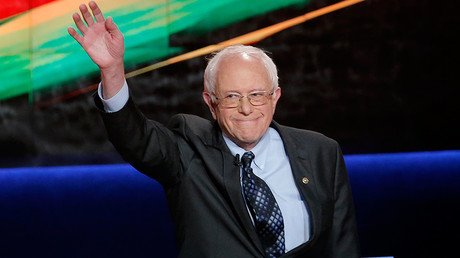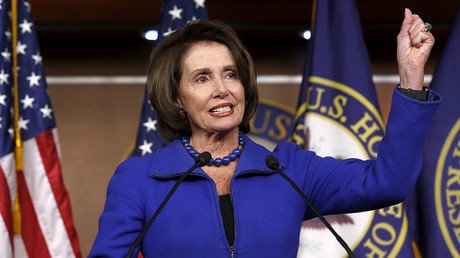Sanders attacks Clinton over Wall Street ties & ‘disastrous trade agreements’
Bernie Sanders has attacked Hillary Clinton over her record with corporate America and “disastrous trade agreements” destructive to the US economy, as well as multibillion bailouts that robbed the state of jobs – all at the expense of the US middle class.
Democratic contenders were debating in Flint, a Michigan city affected by heavy unemployment and water contamination with lead.
One of the questions from the audience was about getting the jobs back to the city. Unemployment in the city stands at over 9 percent, according to the bureau of labor statistics, which is almost double the national average.
Clinton attacked the companies that used help from the government in previous years and are moving their production outside the country, citing Nabisco that announced the move of 600 jobs from a Southside Nabisco plant to Mexico last week.
“I’m going to claw back those benefits. They’re going to have to pay back if they’re leaving a place that actually invested in them. I’m also going to go after companies like Johnson Controls in Wisconsin. They got part of the bailout … now they want to move some of their headquarters to Europe. They’re going to have to pay an exit fee.”
Sanders was quick to strike back. “I’m very glad, Anderson, that secretary Clinton discovered religion on this issue,” he said.
He also accused Clinton of supporting “disastrous trade agreements” such as Nafta and TPP.
HRC always gets pissed off while Bernie stays cool with substance answers #DemDebatepic.twitter.com/DmznZ7Yas9
— Ed Schultz (@NewswithEd) March 7, 2016
Clinton struck back noting that Sanders voted against bailing out the auto industry in 2008, in a move that ended up costing taxpayers $9.26 billion.
Hillary has no clue that the "auto bailout" didn't save ONE single job in Flint. We used to have 80,000 GM jobs here. Today? 5,000 jobs left
— Michael Moore (@MMFlint) March 7, 2016
That’s when the exchanged started heating up, loosing the usual courtesy of Democratic Debates compared to Republican ones.
“Whoa, whoa,” Sanders said, calling it a Wall Street bailout where “some of your friends destroyed the economy.”
Sanders says Clinton's Wall Street "friends destroyed this economy" https://t.co/jMlc0bZST3#DemDebatehttps://t.co/OiNONYYojM
— Bloomberg Politics (@bpolitics) March 7, 2016
“I said let the billionaires bail themselves out. And let’s help the middle class,” he said.
Sanders moved to the subject of Clinton’s speeches, given to Wall Street banks - for which she got hundreds of thousands of dollars - saying that if she was paid that much, the speeches must have been “fantastic” and they should be released to the public.
Clinton tried to jump in several times.
Sanders cut back: “Excuse me, I’m talking.”
.@BernieSanders to @HillaryClinton at tonight's #DemDebate: "Excuse me, I'm talking!" pic.twitter.com/ooRbrgOtQN
— MSNBC (@MSNBC) March 7, 2016
Clinton reiterated that she would have released the speeches if others' Wall Street associations were also made public.
“Here it is!” Sanders shouted, throwing his hands up as if he is throwing papers. “There ain’t nothing! I don’t give speeches on Wall Street!”
Clinton gave an example of Barack Obama, who “took more money from Wall Street in the 2008 campaign”, but ended up being tough on Wall Street by signing the Dodd-Frank act.
"If you were going to be in some way distrusted or dismissed about whether you can take on Wall Street if you ever took money, President Obama took more money from Wall Street in the 2008 campaign than anybody ever had," she said.
"And when it came time to stand up to Wall Street, he passed and signed the toughest regulation since the Great Depression with the Dodd-Frank regulations."
But Clinton’s rhetoric has continued to be at odds with her record, political author Ted Rall says.
On both sides, we are “seeing a clash between authenticity and establishmentarian politics.” And Hillary, according to Rall, was always firmly on the establishment side, although Sanders has succeeded in pushing her to the left in this campaign.
However, Clinton continues to benefit from union endorsements – something that could give her a leg up. “Nevertheless, it’s also interesting, because Michigan and all of the upper Midwest… was devastated by NAFTA, WTO and world trade agreements in general,” Rall says.
“So I think it’s going to be interesting to see this clash between union endorsements versus the very real effect on working men and women that free trade and outsourcing and exporting jobs has had.”
It’s misguided to think that Sanders’s campaign ever lost momentum, according to Rall. This is because his voter base is his voter base no matter what – they have a dislike of the media, Wall Street and mainstream politics. So, for his voters, it’s never been a choice between him and Clinton.
And although it will all come down to the Midwestern states in the end, the Democrats, Rall maintains, won’t wish to tip the balance of their support in favor of Clinton if they see Sanders has a better chance of standing up to Trump and the Republicans.
Although both hit out at Trump, Sanders at one point said he’d “love” to run against the controversial figure, noting many recent opinion polls, which showed him faring better against the Republican candidate than Clinton.














